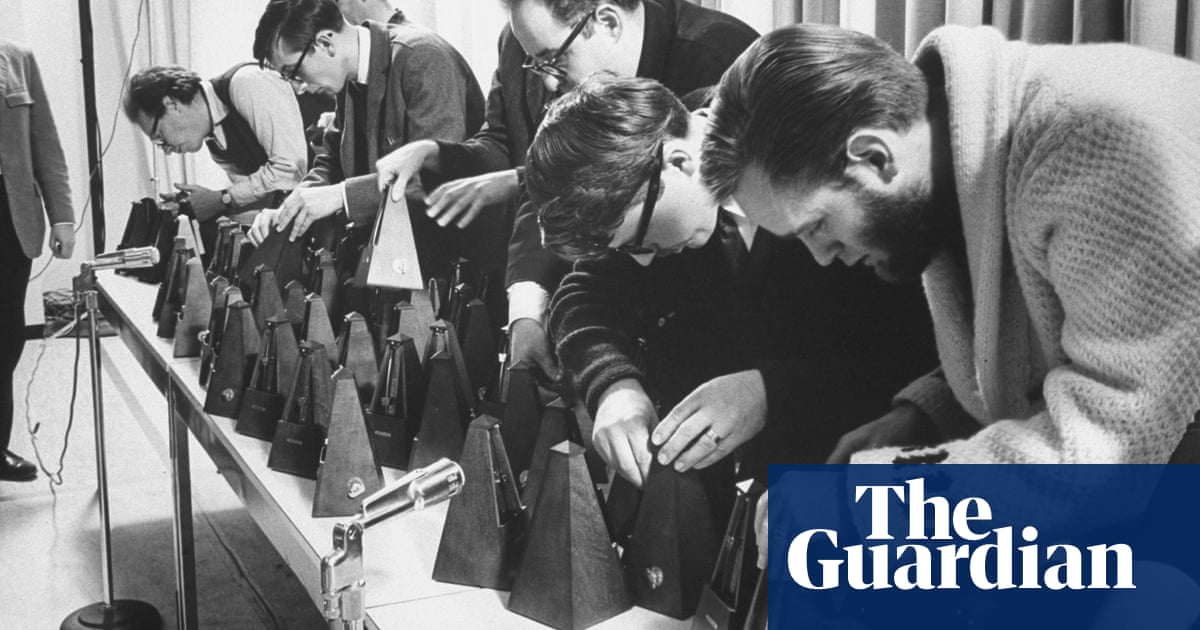
In Stanley Kubrick’s 2001: A Space Odyssey, the appearance of the big black monolith is intensified by strange, ominous music. Voices and instruments cautiously creep outwards from a low B-flat, nervously circling around a few notes. The music gropes its way along, spreading, bifurcating and expanding to fill the sonic space. In no time, it has grown into a complex, teeming mass of sound. This music is the Kyrie from Hungarian composer György Ligeti’s 1965 Requiem, a Latin mass for the dead written by a Jew whose father and brother were murdered in Hitler’s death camps. This Requiem is far from consoling. It is a fierce confrontation with the terrors of the 20th century. A rare performance of the complete work will take place at this year’s BBC Proms, part of the celebrations for the centenary of this shapeshifting musical genius.
Kubrick famously didn’t get Ligeti’s permission to use his music as extensively as he would have liked in 2001. After initial rancour and threats of litigation, composer and film director eventually reached an uneasy accommodation. Each admired the other’s work and, perhaps, recognised their shared brand of near pathological perfectionism. As well as the Requiem, Kubrick also uses Ligeti’s cloudy orchestral masterpiece Atmosphères as the overture to 2001 and in the trippy Stargate sequence, the ethereal a cappella choral textures of Lux Aeterna to portray the emptiness of space, and an electronically altered version of his mini-opera Aventures/Nouvelles Aventures in the final scene.
The director went on to use more of Ligeti’s music in his other films: the luminous orchestral work Lontano is deployed in The Shining to heighten the supernatural atmosphere when the boy Danny is “shining”. And in his final film, Eyes Wide Shut, Kubrick chose an early Ligeti piano piece, the second of the Musica Ricercata. With its obsessive repetition of only two pitches – E and F-sharp – this chilling and claustrophobic music leaves us in no doubt about the fear and dread inside Tom Cruise’s head. When a third note – G – is eventually hammered out, it does nothing to relieve the tension. Ligeti wrote Musica Ricercata as a young composer working under grim restrictions in postwar communist Budapest. That third note, he said, was “a knife through Stalin’s heart”.
Ligeti was born in 1923 to Hungarian-speaking intellectual parents in Transylvania, then under Romanian rule. He was a late starter as a musician, but decided to study composition after his desire to be a scientist was frustrated by tightening Nazi antisemitic laws. As the second world war escalated he found himself conscripted into forced agricultural labour, escaping the terrible fate of his father and brother only by luck. He began his life as a composer under grim artistic restrictions in postwar communist Hungary, finally escaping to the west in 1956. “I did not choose the tumults of my life,” Ligeti later said. “Rather, they were imposed on me by two murderous dictatorships: first by Hitler and the Nazis, and then by Stalin and the Soviet system.”
If all of this led to music that could be unrelenting, there is another side to Ligeti. A piece of old BBC footage shows the famously ice-cool Pierre Boulez getting the giggles while conducting a 1971 performance of Ligeti’s Aventures/Nouvelles Aventures at the Roundhouse. Although the works are impeccably avant garde, you’re allowed to laugh. Ligeti – like Haydn – was a composer who could pull off that rare trick of being laugh-out-loud funny in music.
Try the mischievous prelude to his 1977 opera Le Grand Macabre played entirely on 12 vintage car horns, like a steampunk rewrite of the grand trumpet overture to Monteverdi’s L’Orfeo. Or the jaw-dropping trick which happens in numerous pieces, from Atmosphères in the early 60s to the dazzling L’Escalier du Diable (The Devil’s Staircase) piano Étude of the late 80s, where the music climbs up and up as high as it can possibly go and then seems to fall off the top of itself, only to reappear immediately down in the lowest, murkiest depths. It gives me the giddy feeling of being picked up and turned upside down. Or perhaps of finding myself thrown to the bottom of an MC Escher staircase. Ligeti died before he could write his intended Alice’s Adventures in Wonderland opera, but we do have some Nonsense Madrigals, including a hilarious version of The Lobster Quadrille complete with a Ligeti-snatch of God Save the King.
With Ligeti, however, tragedy is never far away. In his Poème Symphonique (Symphonic Poem) from 1962, 100 mechanical metronomes are set out on the stage in the formation of a symphony orchestra, each one solemnly wound up and set in motion at different speeds by a performer wearing formal evening dress. Ligeti was inspired at the time by the Fluxus movement and it is often billed as a “fun” piece. When the metronomes are let loose, the aural effect of this weird, mechanical orchestra is like rain on a roof or swarms of loud insects. As they gradually wind down, intriguing patterns, rhythms and ticking melodies emerge. By the end, there are only three, then two and then just one solitary metronome – the survivor – ticking away on the stage until it too falls silent. I always find it devastating.
After the Soviet tanks rolled into Budapest to crush the 1956 rebellion, Ligeti escaped across the border to Vienna on a train, hidden under mail sacks. Soon he headed for the nerve centre of the European avant garde, the Electronic Music Studio in Cologne where Karlheinz Stockhausen was king. With no patience for the isms and dogmas of western postwar music – he’d had enough of that under the Soviets – Ligeti quickly absorbed electronic music, serialism and jazz. In later years he would do the same with pop music and American minimalism, African and Indonesian music, fractal geometry, the impossible rhythms of Conlon Nancarrow, the sound of Miles Davis, Bill Evans, Supertramp. Everything was devoured and brilliantly reshaped by his formidable intellect and fantastical outsider imagination.
It is perhaps this musical voraciousness which has meant that Ligeti’s music has achieved wider cultural cut-through than most of his postwar avant garde contemporaries. Contemporary musicians such as Mica Levi (think of their clustery score for Jonathan Glazer’s Under the Skin), Squarepusher and the late Mira Calix have all been attracted to Ligeti’s dense sound masses and, equally, to his fascination with quirky musical machines. Ligeti’s self-styled “meccanico” music can involve old-fashioned mechanical instruments (metronomes, barrel organs or player pianos) or human musicians pretending to be machines. In the third movement of his 1970 Chamber Concerto, the orchestra simulate a kind of giant Heath Robinson clockwork with cogs of different sizes whirring and clunking at different speeds.
The 22-year-old experimental sound and visual artist Damsel Elysium credits Ligeti as an important influence on their music: “‘His music is weird, fun and truthful,” they tell me.
Jonny Greenwood, composer and Radiohead guitarist, cites the dense, creeping textures of Ligeti’s 1968 string orchestra piece Ramifications as a big influence on his score for Lynne Ramsay’s film You Were Never Really Here. And “Ligeti’s mechanical piano/barrel organ pieces were, and remain, a constant reference during Radiohead recordings”, he says.
Greenwood is also attracted by the notion that Ligeti resisted writing much electronic music, despite his first stop-off in the west being Cologne’s Electronic Music Studio. “I love his commitment to ink and paper,” says Greenwood, “that he managed to use something so fundamental to create new sounds from old technologies such as orchestras and pipe organs.” Greenwood views Ligeti’s ultimate rejection of electronic music as “an utterly modern stance – the complexity (and imperfections) of people and mechanisms being far more interesting than precise repeatability”.
Still, it’s easy to hear how the ear-opening possibilities of electronics had a lasting effect on the way Ligeti’s music for real, human musicians actually sounds. I’m thinking of Atmosphères, that study in smudged orchestral colour which, although no electronics are involved, sounds as if Ligeti is slowly filtering the frequencies of the orchestra up and down on an imaginary mixing desk, allowing delicate veils of sound to waft past our ears. Or of the ravishingly vulnerable sound masses of detuned strings, ocarinas and slide whistles in the Violin Concerto of 1992. Or of the unearthly, spectral sonic vibrations arising from the combination of four “naturally” tuned horns in one of his extraordinary last works, the Hamburg Concerto. In the final, short movement of this Concerto, blurry hymn-like horn chords gradually overwhelm the slow pulse of a walking bass and Ligeti appears to stare death right in the face. It’s hard to imagine music more raw and beautiful – and human.
The BBC Proms 2023 run from 14 July to 9 September
Prom 36: A Space Odyssey, featuring Ligeti’s Requiem and Lux Aeterna, is the Royal Albert Hall, London, on 11 August












